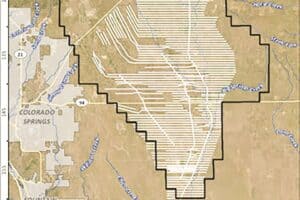Emergency power alternatives
By Terry Stokka
Several years ago, I decided to set up our home for an emergency generator to be connected to our home electrical system. My wife and I had talked about emergencies like blizzards but we were also increasingly concerned about power outages caused by lightning, fires, terrorist acts or overloads on the national electrical grid.
We saw three options for power: (1) a small portable generator to provide power for basic things like refrigerator, freezer, TV, computer and a few lights; (2) a mid-sized portable generator connected directly into the house electrical system; or, (3) a permanently mounted generator that would automatically start when the power from Mountain View is interrupted. Here are my thoughts on these alternatives.
Small portable generator
I have a Coleman portable generator that weighs about 40 pounds and produces 1850 watts of power. You can get a small used generator like this for $150 to $300. This is the size you would use for camping or working on a job site away from an electrical source. For a power outage in your home, you place it outside the garage (never inside the garage because of carbon monoxide dangers) and run extension cords into the house for the fridge, freezer, TV, computer and a few lights. You wouldn’t be able to power all of those at the same time because it is too much of a load, but if you power the fridge or freezer for a couple of hours each day it will keep things cool and frozen. You would have to alternate which appliances you were powering at the same time so as to not overload the generator. The largest downside to this alternative is that you don’t have 240-volt power to run the well pump so you don’t have water available from your well. A manual well pump like a Simple Pump can provide water from a well as long as it isn’t too deep a well. Be sure to have a few gallons of gas on hand at all times.
Mid-sized generator that connects to the house electrical system
This is the system we decided to install. It seems to us to be a good compromise between the two other alternatives. We had an electrician install a transfer switch on our electric line coming from Mountain View Electric. This switch will disconnect MVEA from our house and connect to a plug on the transfer box that we connect to a generator. We purchased a portable generator that has 7,500 watts of power with 13,500 watts of surge capability and also a 240-volt capability. The surge capability is critical because every electrical device takes extra electricity when it is starting. The generator uses about a quarter gallon of gas each hour. We keep the generator in a corner of the garage and start it up every couple of months in the winter to make sure it runs OK. When the blizzard cut our power, we wheeled the generator outside the garage (it works fine even with a blizzard raging around it) and connected it to the transfer switch outlet. With this setup, we provided power to the whole house through the breaker panel in the basement. We had to be cautious not to use large appliances like an iron, electric water heater, space heaters, but we could run lights, fridge, freezer, TV and computers all at the same time. The transfer switch costs about $2,000 and the generator about $750 for a total of around $3,000.
Permanent generator
A permanent generator mounted on a concrete pad is the ultimate system. If the power is interrupted for five seconds or so, the generator starts automatically, disconnects from MVEA and powers the entire house. These can be powered by gas or diesel or some use natural gas which is not likely to be interrupted in a storm. This system would cost about $10,000 to $15,000.
Our power has only been interrupted three times in 21 years, 11 hours in 2002 during a snowstorm, 49 hours in the bomb cyclone of March 2019 and two hours when a tree fell on power lines in our neighborhood. So each of us has to decide how much we are willing to spend for the few times when the power is out. It is reassuring to have emergency power, especially if residents in the home need electricity because of health issues. We are seldom out of power but when it is out, we quickly realize how much we depend on it.






